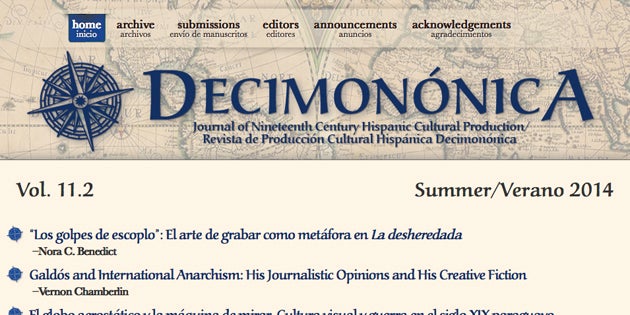Literary scholars from around the world are talking about a journal co-edited by College of Charleston Hispanic Studies professor Mike Gómez. Decimonónica, or DXIX, has received more positive comments than any of the other 119 journals listed on the Hispanic Studies Journals & Academic Presses blog.
So, what is DXIX and why is it so great?
DXIX is an electronic, online journal of Nineteenth-Century Hispanic cultural production. Gómez is co-editor along with Miguel Fernández (Middlebury College) and J.P. Spicer-Escalante (Utah State University).
RELATED: Learn more about Decimonónica.
As for the reason for Decimonónica’s appeal, Gómez says it’s because Latin American and Spanish literature of the 19th century is inherently fascinating and because of the community that the journal builds.
“Where I feel that DXIX truly distinguishes itself is in its treatment of authors,” Gómez explains. “We recognize that all of us –editors, evaluators and contributors alike–form part of a community in which, when things are going well, shared intellectual growth, recognition and mutual professional respect play central roles.”
Typically there is only six weeks between submission and final decision when authors submit to DXIX as opposed to several months (or more) for other publications. The dedicated Editorial Board also provides detailed commentary on all pieces and submitters are encouraged to develop their work, whether or not it is ultimately selected for publication.
DXIX was awarded the Respo Award for consistently positive posts for a period of two consecutive years at the blog. “Respo” refers to “responsible,” or “responsable” in Spanish.
What’s Next?
Gómez says he would like to produce a special issue which revolves around a specific focus—for example, “Science and Scientific Thought in 19th Century Hispanic Literature and Culture.”
“There are some topics that I feel are underrepresented in the field of Hispanic Studies,” Gómez notes. “If through such a project I was able to stimulate production then that would be a very gratifying thing.”
Gómez’s specialization is in Spanish literature of the 19th and 20th centuries, specifically of the Realist, Naturalist and Modernist persuasions. He’s also fascinated by the many intersections between literature, philosophy and science, so a special issue of the sort described above would really pique his interest and, he thinks, that of Decimonónica’s readers.
RELATED: See GoodReads.com’s list of top Spanish literature.
“As an editor for DXIX, I have learned more than I thought—both about the content of the area in which I specialize (Hispanic Studies), as well as about the process of submitting articles to the academic press. The first has made me a better teacher and a more interesting conversationalist (I hope); the second has provided me with the patience and perspective that I so desperately need when I submit my own research for consideration.”





